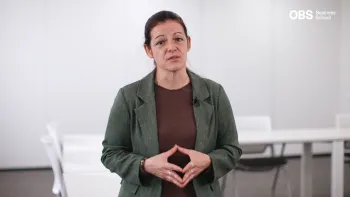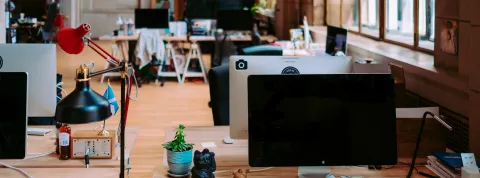
Master in CSR and Sustainable Leadership
- ONLINE
- 60 ECTS
- 7500€
- OPEN CALL
- 12 MONTHS
- SPANISH
The Master in Corporate Social Responsibility and Sustainable Leadership prepares students to lead companies that want to take management at another level and develop long-term sustainable strategic plans. It also provides them with the necessary competencies, tools and techniques in order to apply corporate social responsibility in organizations at a global level.
Master in CSR and Sustainable Leadership (Spanish)

Universitat de Barcelona
Get a double degree from our academic partner, the reference university in Catalonia and Spain with more than 560 years of history behind it.

QS Stars Rating System
We are the first 100% online Business School in the world to receive the QS Stars rating, obtaining the highest distinction, five QS Stars, in the Online Learning category.

Ranking Eduniversal
The Master in CSR and Sustainable Leadership is in the TOP 3 in Spanish in the category of Sustainable Development and Environmental Management of Eduniversal's Ranking.
Master in CSR and Sustainable Leadership’s Syllabus
Our program is structured in 2 blocks and culminates with the Master's Thesis. In addition, during the development of the program there will be four voluntary bootcamps and different additional activities.
Block 1. Sustainability, sustainable management and CSR
Block 2. CSR, communication and green entrepreneurship.
Master's Thesis
Bootcamps and additional activities
1. Sustainability, sustainable management and CSR
This module has an introductory character and will present the main trends in sustainability. Students will analyse the consequences of "non-sustainability" from a social and economic point of view, as well as "why" the latter continues to spread. Through all these analyses, students will discover why the development and implementation of sustainable actions and strategies is essential in business nowadays.
Professor: Elena Bulmer Santana, Biodiversity Coordinator at Worldwatch Institute Europe.
VIEW LINKEDIN
During this module, students will be introduced to the meaning of sustainable business and how it differs from the traditional and non-sustainable approach to business. Students will learn about the development of sustainable competitive advantages. We will define the strategic sustainable management term and study useful analysis and strategic decision making methods from a sustainability point of view in order to make the best choice of ethical and responsible management approaches.
Professor: José Antonio de la Rosa López, Professor in different academic institutions.
VIEW LINKEDIN
The point of this module is to help students develop a series of interpersonal skills. They will discover what strengths make them a leader and what weaknesses they should improve in order to become the best directors and managers. Through this self-learning path, students will explore the implications of leadership in organizational and project management so that by the end of the module, they’ve grown more self-confident and self-aware, both essential traits to enhance one’s professional development.
Professor: Corine Cassé Carrión, Co-founder and President of the Network of Women Entrepreneurs in Movement (REM)
VIEW LINKEDIN
Through the contents of this course, students will come to understand the benefits of becoming leaders or "change agents" in favour of sustainability; they will integrate said lessons through active listening, coalition building and networking.
Professor: Susana Muñoz Miguel, Founder, business advisor, strategic mentor and executive coach at YNFINIT INNATE POWER.
VIEW LINKEDIN
In the fifth module, students will learn how to develop and implement a Corporate Social Responsibility (CSR) strategy in an organizational environment, either at a project or company level. They will learn about Social Responsibility diagnostics inside and outside the company in order to implement effective sustainable organizational strategies; in addition, students will learn to use the right tools to measure each strategy’s impact.
Professor: Candida Diano Pucci, Founding Partner at Axaria Europe, SL.
VIEW LINKEDIN
2. CSR, communication and green entrepreneurship
CSR is not only important for the company's management, but also for its operations. There are a series of ethical and sustainable values that have to be reflected in the daily work of the organization throughout its value chain, from the initial demand stage to the distribution stage.
Professor: Javier San Martín María, Managing Partner at Ogaranzo.
VIEW LINEKDIN
There is a growing demand for sustainable projects inside and outside the company. Sustainability is not only of importance at an organizational level, but also at a project level, which are oftentimes called "temporary organizations". Something that is especially important in the case of sustainable projects is the multidisciplinary approach.
Professor: Rosario Fresneda Fernández, Senior Project Management Freelance Consultant.
VIEW LINKEDIN
A multidisciplinary character is essential in sustainable projects; however, the communication is just as crucial, both at an internal and external level. “Green” or "sustainable" communication is key to disseminating the company's sustainable values while ensuring that there is an alignment between the different internal and external stakeholders of the organization. This module will focus more on the internal communication of the company.
Professor: Rosario Fresneda Fernández, Senior Project Management Freelance Consultant.
VIEW LINKEDIN
There is a tendency nowadays towards what is called “Green Marketing”. Green and sustainable advertisements make it clear that different companies care about the environment, which has become essential in today’s context. In this module, students will learn about the true meaning behind what we call “Green Marketing” and the best strategies used by real tcompanies.
Professor: Julio Blas Blas, President of Echar a Rodar.
VIEW LINKEDIN
There’s no doubt that sustainability is considered "fashionable" nowadays. However, it is our job to show how necessary it actually is within a business environment. In companies, we often work with limited resources, so we must develop new business strategies designed to face future challenges such as resource availability. Similarly, innovation and entrepreneurship create thousands of jobs annually in a variety of professional fields: education, communication, agriculture, mobility and waste management, among others. In this module, students will delve into the benefits of innovation and sustainable entrepreneurship, sustainable management models and the circular economy, among others.
Professor: David Andrés Hidalgo Carvajal, Research Assistant at Universidad Politécnica de Madrid.
VIEW LINKEDIN
Master's Final Project and Additional Activities
This program is designed to complement the content of the thematic blocks with the necessary training to achieve their assimilation. Said activities are conceived from a triple perspective: technical assistance, personal support and individual and group challenges that are necessary to achieve the objectives set.
Pre-Masters Bootcamps
The student will have the opportunity to take 3 Pre-Master Bootcamps that will open progressively and can be taken at any time. Once these activities are successfully completed, students will receive a certificate of completion.
- Bootcamp 1. Personal Branding
- Bootcamp 2. Data Storytelling
- Bootcamp 3. Creative Thinking and Innovation
In addition, students will also have the opportunity to take these pre-master courses; however, these are available in English only:
- Building Your Professional Brand for Employability and Career Success
- Finance Fundamentals
Introductory Workshop | Campus Training
Before the start of the academic year, students will have the opportunity to attend an introductory workshop to the Campus, where they will be provided with the necessary tools and knowledge for the correct use of the platform during the academic year.
Professional Development Program (PDP)
Two weeks before the start of the academic year, students will be able to participate in a professional development program where they will work hand in hand with a teacher to develop different skills such as time management, productivity, stress management and emotional intelligence. Upon completion of the workshop, and provided that the relevant activities have been carried out, a certificate of completion can be obtained.
For 6 months, students will participate in the definition, development and presentation of a sustainable development plan. A professor will supervise the project, which will be later be defended before an examining board.
Professor: Elena Bulmer Santana, Biodiversity Coordinator en Worldwatch Institute Europe.
VIEW LINKEDIN
The Lifelong learning Master's Degree in Corporate Social Responsibility and Sustainable Leadership is complemented by conferences and seminars throughout the course. These additional activities are carried out by renowned professionals in business management who present their experiences and practical cases through videoconferences.
Bootcamp: Carbon Footprint Measurement
This course aims to understand the concept of a company's or project's carbon footprint from a general perspective and to understand the calculation methodology. International standards (GHG Protocol and ISO 14064) will be reviewed, as well as various agile methodologies for footprint calculation.
Profesora: Alejandro Pérez Gómez, TCorporate quality and environment expert at ISASTUR.
VER LINKEDIN
Bootcamp: Gender Equality
This bootcamp will teach students about gender equality in a corporate and non-corporate organisational environment.
Professor: Carolina del Campo Vara, Senior International Evaluation Consultant and Senior Gender Expert.
VIEW LINKEDIN
Bootcamp: Management skills
In this bootcamp, students will work on aspects such as emotional intelligence and communication skills; you will learn how to manage stress and practice the process of motivating work teams.
Professor: Susana Muñoz Miguel, Founding Partner at Alchymia Essential Transformation.
VIEW LINKEDIN
Bootcamp: Sustainable business; Sustainability reporting
In this bootcamp, the students will address a lack of CSR in a company. They will analyse the importance of sustainability reporting in organisations.
Professor: Candida Diano Pucci, Founding Partner at Axaria Europe, SL.
VIEW LINKEDIN
Bootcamp: Finances
The objective of this bootcamp is to teach students how to carry out the financial evaluation of their TFM project.
Professor: Juan José Montiel Sanz, Founder at CitiusLogistics
VIEW LINKEDIN
Company visits
During the program, students will have the opportunity to attend synchronous videoconferences with experts in each area. They will share their experiences and best practices in their sector.
Webinars
Most of the training is done asynchronously, which means that this exchange of knowledge is done through a platform that allows sharing written texts without the need for people to be connected at the same time. Additionally, in each of the modules, synchronous sessions or 'webinars' are organized, where all participants are connected at the same time through an application, which allows the exchange of knowledge in 'real time'.
Students taking this Master at OBS Business School will have the opportunity to prepare for the Scrum Certifications (Product Owner & Scrum Master) *.
*The cost of the certifications, as well as the preparatory course, are not included in the price of the program.
Methodology
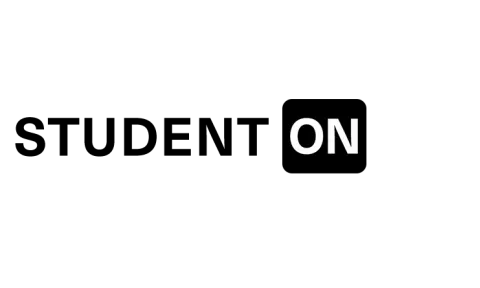
OBS has an online methodology where the core is the student. Always backed by active and internationally renowned lecturers, who share their knowledge to enhance the professional development of students through a flexible, collaborative method with personalised monitoring. The aim is to create a unique educational experience that allows the assimilation of knowledge in a practical way.
Student ON's fundamental pillar is the student and, for this reason, throughout the course students have their Programme Manager, an academic figure who accompanies them in a personalised way.
Diploma
After successfully finishing the Master's degree, and having completed the relevant procedures, you will receive the Master's degree from OBS Business School. In addition, and provided that you meet the established academic and administrative requirements, you will obtain a Lifelong learning Master's degree from the Universitat de Barcelona (UB).
In order to obtain it, you must have a university degree. In the exceptional case of not having this degree and having passed the Master's evaluations, you will obtain a Higher University Diploma from the Universitat de Barcelona (UB).
At OBS Business School we are committed to having our own degree, which allows us to quickly update and adapt the programmes in each edition to be at the forefront of the educational level demanded by companies today. Our programmes are designed for professionals who want to strenghten their management skills and learn through an international experience.
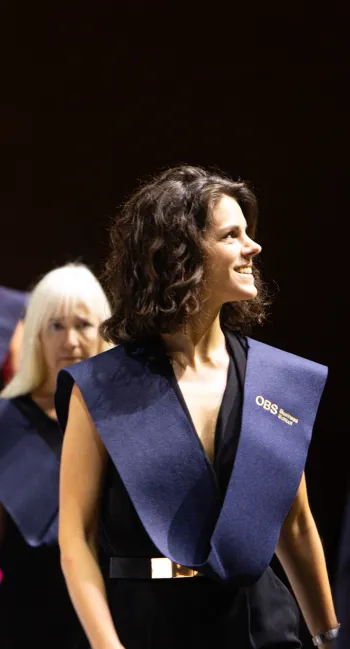
Admission Process
The fundamental aim of our admissions process is to ensure the suitability of candidates. All participants should get the most out of this learning experience, through a context in which it is possible to develop long-term relationships with classmates, faculty and alumni.
After completing the application form for one of our programmes, you will receive an e-mail with information about the School and a member of the Admissions Department will contact you to start the admission process.
Once you have successfully passed the personal interview, you must submit all the required documentation to continue the admission process and certify that you meet the requirements of the student profile. After the Admissions Committee, if it is positive, you will be able to register and enrol in the programme you have applied for.
Student Profile
Our students in the Master in Corporate Social Responsibility and Sustainable Leadership have different backgrounds and come from different sectors, but they all have a common goal: to enhance their management skills to boost their professional careers.
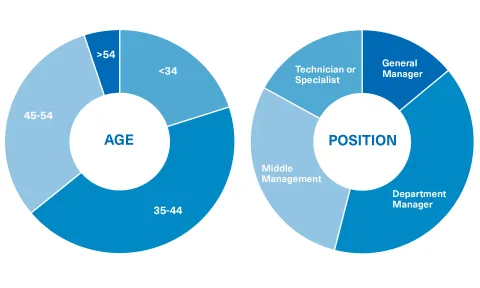
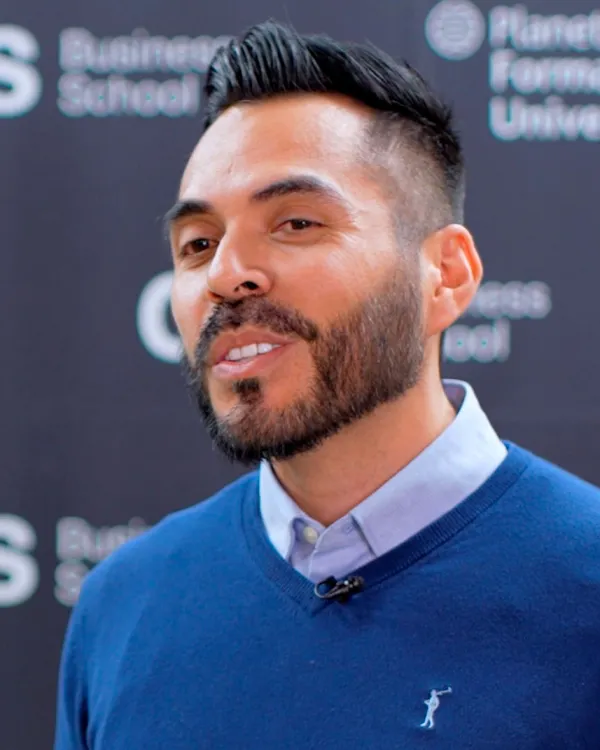
Career Opportunities of the Master in CSR and Sustainable Leadership
Thanks to the Master in CSR and Sustainable Leadership you will be able to boost your professional career as:
- Director of the Corporate Social Responsibility
- Advisor or consultant on sustainability issues
- CSR advisor or consultant
- Project manager in the area of sustainability
- Project Manager in the area of CSR
- CSR Implementation Manager in a company
- Sustainability Implementation Expert

